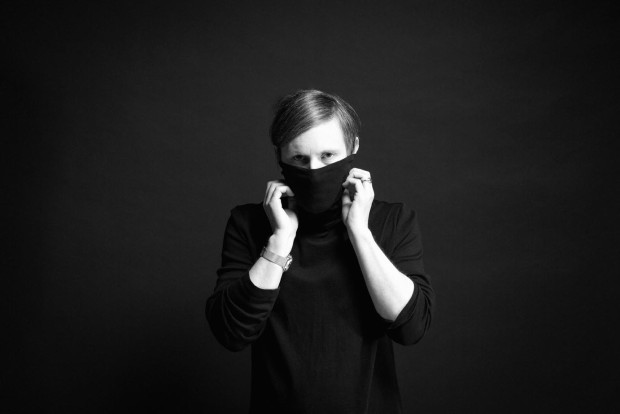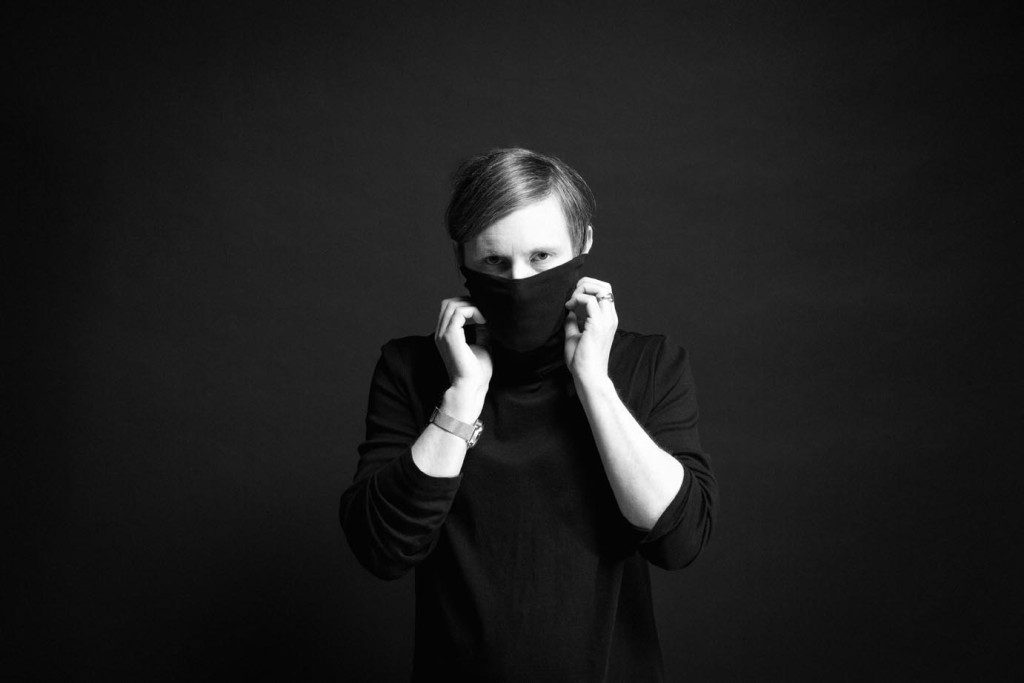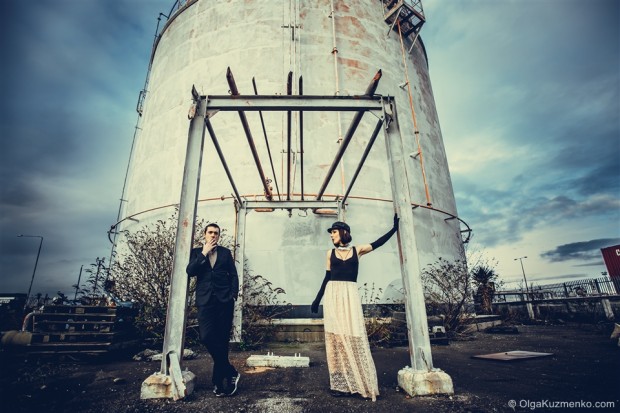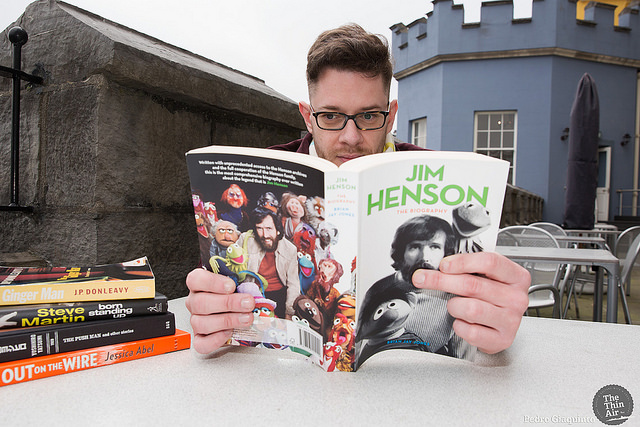When he’s not mustering majestic noise as one half of Fuck Buttons, Benjamin John Power has, for the last five years, been producing his own powerful, synth-heavy sounds as Blanck Mass. Having released one of 2015’s most wonderfully challenging and downright rewarding full-length listens in Dumb Flesh, he has firmly established himself as a conjurer to be reckoned with in the realm of bracingly euphoric dark electronica. Ahead of debut Irish solo shows at Belfast’s Black Box on April 1 and Dublin’s Grand Social on April 2, Brian Coney chats to Power about his thirst for discovery, remixing John Carpenter, the imprint of personal upheaval on his craft and – supposedly – being more Queen than he is Kraftwerk.
Hi Benjamin. You’re in LA after your first solo US tour. How was it?
I’ve been out here for three weeks now and this is the first time I’ve been out as Blanck Mass. There’s been a notable difference and I’ve been pleasantly surprised with turn-out at venues and stuff. Obviously being based in a tiny place outside of Edinburgh, I don’t really have a realistic gauge of how aware people are of this project out here but I’ve been really pleasantly surprised. It’s been a decent turn-out at most of the shows. I’m happy with that but at the same time I’m also looking forward to returning home as well.
Do you take much pleasure in travelling and the “aloneness” of being on the road?
The hard work is being in airports. The playing shows and visiting these cities and actually being lucky enough to be in a position to present what I’ve made to people who are willing to take some time out of their day – that’s rewarding. Without trying to sound too magnanimous it’s a huge privilege. I’ve been making music since I was a kid so to be in this position it would be wrong to have any complaints, really.
It’s good to know that your expectations have been met there and humility reigns supreme. Outside of the creative process, does everything else feel like a bonus for you?
Yeah, it’s a fucking gift, man. Without sounding too much of an asshole, some people try for years for something like this to happen so for me it really is a blessing. I’m happy. Sure, the travel can be gruelling at times but when you get to the other end it’s the best. I love it.
You’re currently touring your second album Dumb Flesh, which was released via Sacred Bones – home to the likes of Marissa Nadler, David Lynch, The Men and one of your heroes, John Carpenter. How did releasing via them come about?
I’m actually at my friend’s Bobby’s here in LA. I finished my tour two days ago but I’m staying out here with him for a couple of days before heading home. I guess I actually met Caleb (Braaten, Sacred Bones founder) through him a number of years ago. We hit each other and I guess he was a fan of Blanck Mass. So when it came to Dumb Flesh being a thing that wasn’t just an idea, we spoke about it and he was really eager to work with me on this record. I love the label, you know. They do everything right. They only work with bands they would listen to at home. So it’s a nice family to be part of. I can be happy on that front.
Yeah, they have a great roster. It seems there’s a thread of malevolence running through a lot of the music…
Absolutely, I agree. And that’s something I can certainly empathise with. They do pretty good with sourcing acts create beauty from a darker place, which is something I certainly sympathise with. So I feel at home.
Speaking of Carpenter, you did a great job remixing ‘Fallen’ for Lost Themes Remixed. How was that and did you have the opportunity to meet him or anything?
No, unfortunately not but I guess it’s just a matter of time before I do. But I don’t know what I would ask, you know? It’s a difficult thing for me. It would be in a situation where, if I met him I would be with Caleb and in that kind of situation you don’t want to have your, like, interviewer hat on. I would probably just ask him what he was drinking or something. But yeah, it was a pleasure to do the remix. It was amazing, really. Whenever I do a remix I tend to try to – and I know it sounds like a bit of a cliché – form a new track entirely from the stems that I’m given. It was nice to have each of the components isolated and to work on that, for sure.
I actually prefer it to the original but yes, two different beasts entirely. Touching upon Dumb Flesh, its release came four years after your 2011 self-titled debut. You’ve spoke about how there was quite a bit of upheaval in the period between – moving hour a few times etc. How do you think those changes informed the tone of the record?
It’s really, really difficult for me pinpoint a particular thing that informs how the creative output is manifested but I certainly feel like leaving the city to live in what is essentially – it’s not even a hamlet, you know? There’s a post office and a Co-Op and that’s it. That’s going to have some impact. I mean, we’re essentially sponges in relation to our environment, aren’t we, as people? I feel like I would have to sit down with a psychoanalyst or something to figure out exactly why it sounds the way it does. But it definitely has its bearing. I’m sure you’ve read there was quite a few very human, humbling things that happened to me during that time. But I didn’t come into the album writing process with a loaded concept, it was more something that materialised and raised its head during the process. It was all very human and without any kind of metaphysical properties that informed the whole thing whenever it started to take shape.
I recall one reviewer summing up the tone of the album as “euphoric dread”, which I felt was totally on the money. Does that sound right to you?
I like that! I’ve not heard that one but I do like that. That’s a nice place for me. That’s actually very nice indeed. It sums up Dumb Flesh pretty well.
Beyond the actual impetus and the influence of external surroundings and personal experiences in the period, did you try to evoke a certain reaction with your music on this release? I found it to be very nicely quite aggressive without being, you know, tormenting. Did you envisage a crowd reacting to it, for example?
Not necessarily at its inception, no. But I certainly operate on that feeling when I’m writing. I need to be excited, irrespective of where my mindset is at at any given point. So it’s definitely important to be at least sympathetic to that whilst creating because as I’m touring this album for the next two years I want to be in a space that I’m going to be comfortable with for however long it may be afterwards. Sometimes that can be difficult because I’m keen on moving around within that space. I don’t want to sit in a comfortable space, ever. So I think that’s hugely important to me.
A huge departure – or progression rather – from your debut is the rife presence of beats on Dumb Flesh. Was there a particular reason why they were largely lacking in the first record?
In the first instance, it all depends on the instrumentation I’m using at any given point to reach a point where I’m comfortable. I think at this time round the sound palette lent itself to that sort of thing. With the first album I was operating with a different set of tools, which manifested itself as something without beats. But I also, as I said before, don’t want to sit in a comfortable place. I need to keep myself interested too, as much as anyone else. I think that’s maybe why that happened.
‘No Lite’ and ‘Dead Format’ off the album really sum that kind of propulsive quality of forward-moving momentum combined with that so-called euphoric dread. But gear-wise, texturally-speaking, you’re delved into modular synths on this record. How was that?
It opened up a lot of understanding with the tools I’d been using for years. I almost approached that in a hobbyist manner and I feel I’ve come out the other end with Dumb Flesh with a much wider understanding of these machines that I would use anyway. But I’m still learning. I didn’t study music technology or anything. I’m operating here purely on feeling and I feel it has helped a lot, that’s for sure.
With that thirst for discovery and desire to learn more in mind, do you think if you ever got to the point where you felt you knew everything you would be therefore dissatisfied?
Yeah. I think if you’re in that mindset you’re not only kidding yourself but maybe a little fucked because that’s when you would sit and rest in one place. I hope that never happens to me. It’s not really in my nature to feel like that. I wasn’t brought up like that, you know? It’s good to be confident and feel like you’re at the top of your game but to feel there’s nothing else to know is maybe a dangerous place. It may be a comfortable place for some. I’m not sure I would ever get there but ultimately I’m pleased by that. I do feel comfortable with where I am, though, creatively and emotionally, especially as there’s a huge emotional connection with what I do. But technically there’s so much to learn and even if you feel you’ve mastered one piece of kit, there’s so much more out there. It’s coming in faster than one can make an LP. The ambition to learn is strong for me.
I think it’s quite encouraging for fans of your music who might also be interested on a production level to hear someone who they might well consider to be at the top of their game be that pragmatic and humble so kudos.
Thank you very much.
Touching on Fuck Buttons briefly, do you feel a certain amount of freedom knowing that you’re making music exclusively on your own terms?
Yeah but it has its pros and its cons. I think perspective is important. It’s good to have another ear on something as you can sometimes get so far down the rabbit hole it can be difficult to gauge whether it’s just too self-indulgent, which I don’t necessarily think is a bad thing. But I do think perspective and space is very important with any kind of creative process. And isolation. I feel that it’s nice to have ideas bouncing around with someone but it’s also nice to present something that is 100% you, therefore it’s completely honest. But Fuck Buttons has always been about not us as individuals but the relationship and how that manifests itself creatively. I feel very blessed to be able to do both, is what I’m getting at. That offers perspective as well – being able to “be” in both worlds.
One assumes you will be doing more Fuck Buttons stuff after this album?
Absolutely. After and during, actually.
Great. You’ve a busy schedule over the next few months. Is there any shows or festivals that you’re particularly excited for?
I’m really looking forward to all of them actually. I don’t want to come across as vague here but they’re all very different and all present themselves in a different way. I wouldn’t say I’m looking forward to one more than the other, really. I was definitely keen to get out here, though, that’s for sure. This was the first time I’ve ever toured as Blanck Mass in the States so I was definitely keen for that to happen. I look forward to the next time it happens as well. But that’s just more present circumstances than anything. I’m also looking forward to coming to Ireland as I’ve never played there as Blanck Mass. But there’s a lot to cover. I think it’s important to cover as much as possible. There’s people who want live music everywhere. In the smallest of places right across the world. It’s what motivates me and I’m very eager to do as much as possible.
With your own music in mind, taking a step back and looking at the bigger picture, do you think there’s enough strong experimental electronic music being made – or better said, heard – in 2016?
Well, living where I do I don’t really have my ear to the ground but it’s very exciting that somebody like myself can actually do this now with a certain level of recognition. I feel there’s a tonne of shit out there. There’s also a tonne of great shit out there which some people don’t want to share with others. But I feel like we’re in a good period. I feel like now more than ever you can be as weird as you like.
One last thing: I had a bit of a chuckle earlier at this line for the Observer’s review of Dumb Flesh. “The totalitarian self-regard of these bombastic modular synth symphonies owes more to Queen’s ‘One Vision’ than it does to Kraftwerk’s Man Machine.” Quite the inverted compliment, I thought.
Oh yeah! I think they were trying to have a dig there but that doesn’t bother me at all, actually. I found it interesting that that would be used as a negative because I think what it’s trying to get at is: “Kraftwerk are cooler than Queen”. But that’s one person’s outlook, you know? To me that’s not a negative. And also I’m not sure I believe it. I actually read the “best worst” review of mine for the first record. I don’t want to name names here but it was kind of funny. At one point in the review they try to negatively say, “This sounds like something from a nature documentary.” I was like, that doesn’t sound too bad, actually! It was used as criticism but to me it sounds like something I would really get behind anyway. Each to their own, you know?
Indeed. Either way, that’s in very stark contrast to the really positive review it did get anyway.
That’s true, actually. Thanks, I really appreciate that.
Blanck Mass plays Belfast’s Black Box on April 1 and Dublin’s The Grand Social on April 2. Go here and here to buy tickets. Enter our competition to win two tickets to the Dublin show here.







